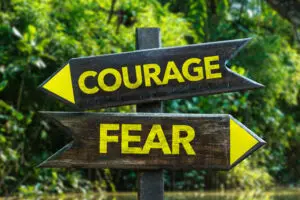What is the single most important thing you would do for yourself today if you weren’t afraid? This question plays on the fantasy of being completely free of fear, and can highlight your heart’s deepest desires. There is so much you might try if fear was not stopping you, but the reality is fear often does interfere with your dreams. Fear is a necessary experience that helps preserve your safety, yet it can also become a “false ceiling” to your goals. It is impossible to completely eradicate fear from your life, and frankly you wouldn’t want to because it would make you reckless and at greater risk of harm. You are better off striking a balance between experiencing your fear while also finding ways to continue toward your goals. Managing your relationship to fear and understanding how to interface with this deeply uncomfortable emotion are keys to galvanizing deeper confidence, courage, and achievement.
A famous interaction takes place during an early season of the HBO series Game of Thrones. Two characters are discussing a third character, Ned Stark, and reflecting on Ned’s seemingly endless bravery. Ned is a character that never seems afraid, and is widely viewed as one of the more courageous men in the kingdom. As the characters talk about Ned, one recalls a time when Ned admitted to feeling fear regularly despite his reputation. In that exchange, Ned was asked, “how can [one] be brave when they are afraid?” Ned responded, “that is the only time someone can be brave.” This interaction highlights a significant tension between bravery and fear. The two emotions coexist in a way that seems paradoxical and even mutually exclusive. However, one side of the experience necessarily depends on the other. Since you cannot separate the two, there needs to be a level of acceptance that your striving to overcome fear necessitates that you start in your experience of fear.
With an understanding that fear will accompany your journey as you seek to overcome it, you now get to decide how to proceed. You must have a purpose to taking on adversity, as this purpose will fuel your endurance while facing hardship. The key to facing fear is not minding that fear hurts. By choosing to face a fear, you are inviting the discomfort in the hopes that there might be some payoff at the end. Perh
Once you know why you want to face a fear, then you have to determine the best way to do so. It is imperative that you always consider your physical and emotional safety when you choose to face fear, regardless of what it is. Fear, as mentioned previously, serves the purpose of keeping you safe and protected from potential threats. Rattlesnakes strike fear into the hearts of many people, and there are obviously good reasons given the possible danger posed by mishandling this creature. It would not be effective to dismiss this fear in a reckless manner, but instead to identify what a healthier relationship with fear could look like. For instance, perhaps you will never be interested in handling snakes, but you might like to take hikes in the foothills behind your home where snakes could potentially be. Feeling too afraid to take the hikes could detract from your life, yet having the ability to hike while holding a tolerable tension between the possible risks and rewards gives you more freedom. There are both healthy and unhealthy ways of facing fear and it is important to be able to distinguish the difference.
One way to improve your chances of success when facing fear is to ask for help from someone with expertise. Simply trying to overcome your fear of water by forcing yourself into a swimming pool without any support or guidance would not be the most effective approach. Beyond the physical risk, you could also exacerbate your existing fear as you expose yourself to additional negative experiences of water. Having a coach present who understood both the fear itself as well as the safest ways to interact with water would introduce a whole new layer of support. Taking on a fear is never easy and the more allies you can count on, the better off you will be. The type and breadth of support you might need will likely vary, but you can always look toward emotional support as a good starting place. Many people don’t like to expose their fears and can even try to hide them because they worry about others rejecting them. Seek out resources that create a safe space for you to openly explore your fear, as this can help illuminate solutions to bolster your progress toward goals. One must believe they have some ability to face a fear, and having allies, coaches, therapists, doctors, or other experts can help galvanize such belief. Moreover, you can also learn practical skills that can concretely help your journey. Perhaps your guides have special training they could share that equips you in an empowered way to take on more than you thought possible.
Choosing appropriate methods and settings to face fear will all have a significant impact on how successful you will be. The goal of facing fear is to somehow overcome the “false ceiling” it presents. This process might take time. You cannot simply face a fear one time and expect you will never feel afraid of it again, but you will have gained ground in a few ways. One of the most important is proving to yourself that you can face the fear in the first place. Another is that you overlaid a more positive, empowered experience over your previously negative experiences. Additionally, you might have learned something new about yourself that helps you believe you are more capable, leading to higher confidence. Each of these factors will enhance your ability to face the fear in the future.






